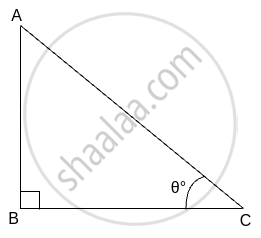Advertisements
Advertisements
प्रश्न
Prove the following trigonometric identities
`((1 + sin theta)^2 + (1 + sin theta)^2)/(2cos^2 theta) = (1 + sin^2 theta)/(1 - sin^2 theta)`
उत्तर
LHS = `(1 sin^2 theta + 2 sin theta + 1 + sin^2 theta - 2 sin theta)/(2 cos theta)`
`=> (2(1 + sin^2 theta))/(2 cos^2 theta) => (1 + sin^2 theta)/(1 - sin^2 theta)` `[∵ cos^2 theta = 1 - sin^2 theta]`
∴ LHS = RHS Hence proved
APPEARS IN
संबंधित प्रश्न
Prove the following trigonometric identities.
`(tan A + tan B)/(cot A + cot B) = tan A tan B`
Show that : tan 10° tan 15° tan 75° tan 80° = 1
Prove the following identities:
`1/(cosA + sinA) + 1/(cosA - sinA) = (2cosA)/(2cos^2A - 1)`
`sin theta/((cot theta + cosec theta)) - sin theta /( (cot theta - cosec theta)) =2`
` (sin theta + cos theta )/(sin theta - cos theta ) + ( sin theta - cos theta )/( sin theta + cos theta) = 2/ ((1- 2 cos^2 theta))`
If`( 2 sin theta + 3 cos theta) =2 , " prove that " (3 sin theta - 2 cos theta) = +- 3.`
If `sec theta + tan theta = x," find the value of " sec theta`
Write True' or False' and justify your answer the following :
The value of \[\cos^2 23 - \sin^2 67\] is positive .
Write True' or False' and justify your answer the following :
The value of sin θ+cos θ is always greater than 1 .
If a cos θ + b sin θ = m and a sin θ − b cos θ = n, then a2 + b2 =
Prove the following identity :
`cosec^4A - cosec^2A = cot^4A + cot^2A`
Prove that `sinA/sin(90^circ - A) + cosA/cos(90^circ - A) = sec(90^circ - A) cosec(90^circ - A)`
Without using trigonometric identity , show that :
`sec70^circ sin20^circ - cos20^circ cosec70^circ = 0`
Evaluate:
`(tan 65^circ)/(cot 25^circ)`
Prove that sec2 (90° - θ) + tan2 (90° - θ) = 1 + 2 cot2 θ.
If x = h + a cos θ, y = k + b sin θ.
Prove that `((x - h)/a)^2 + ((y - k)/b)^2 = 1`.
Prove that: `1/(cosec"A" - cot"A") - 1/sin"A" = 1/sin"A" - 1/(cosec"A" + cot"A")`
Show that `(cos^2(45^circ + theta) + cos^2(45^circ - theta))/(tan(60^circ + theta) tan(30^circ - theta))` = 1
Prove that `(cot A - cos A)/(cot A + cos A) = (cos^2 A)/(1 + sin A)^2`
Find the value of sin2θ + cos2θ

Solution:
In Δ ABC, ∠ABC = 90°, ∠C = θ°
AB2 + BC2 = `square` .....(Pythagoras theorem)
Divide both sides by AC2
`"AB"^2/"AC"^2 + "BC"^2/"AC"^2 = "AC"^2/"AC"^2`
∴ `("AB"^2/"AC"^2) + ("BC"^2/"AC"^2) = 1`
But `"AB"/"AC" = square and "BC"/"AC" = square`
∴ `sin^2 theta + cos^2 theta = square`
